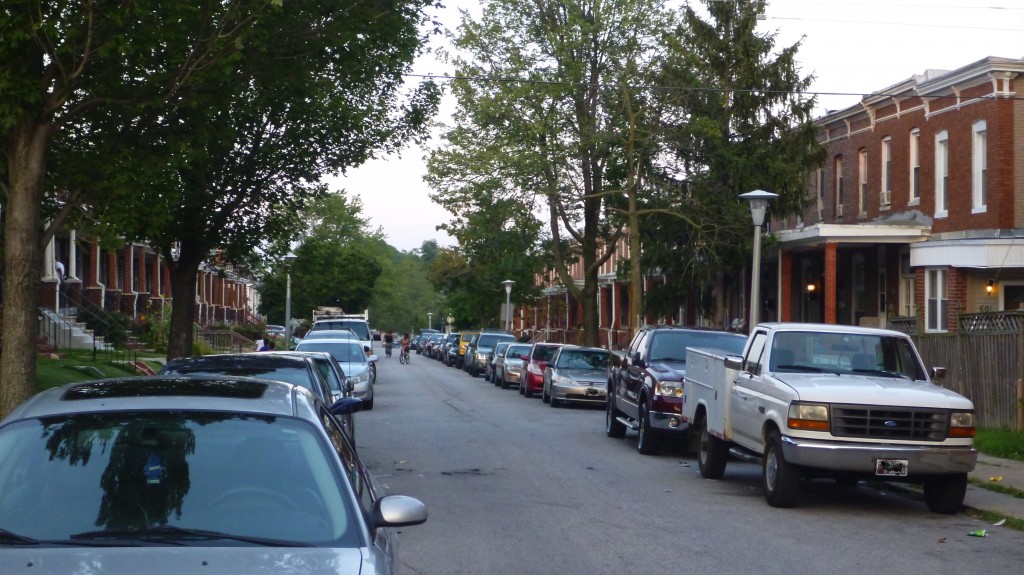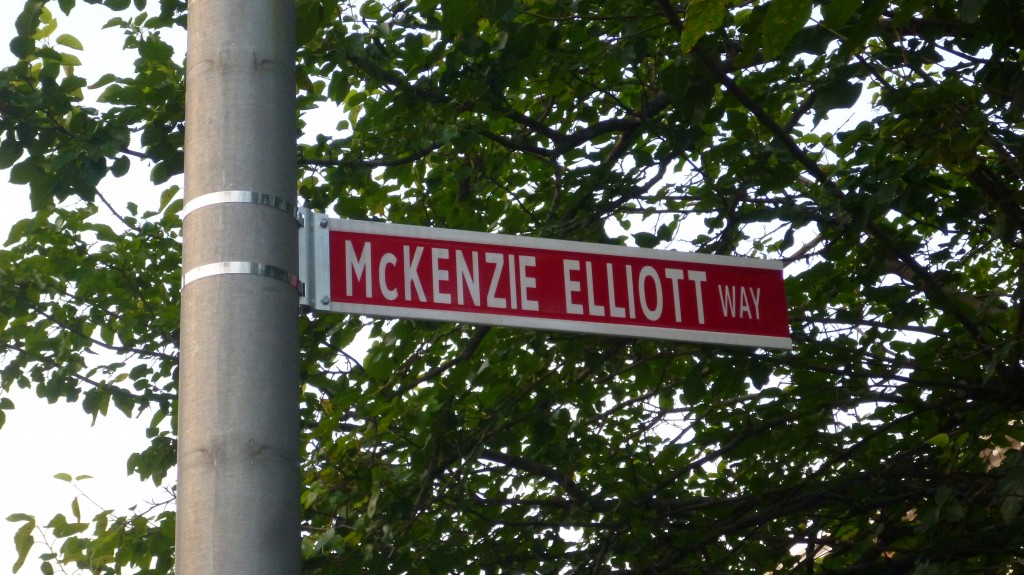August –
Three-year-old McKenzie Elliott sits on a neighbor’s front porch in Baltimore. She waits excitedly for her stepfather. It is a sweltering day and he will take her swimming.
He is late – traffic is bad. A car stops at the corner of 36th St and Old York Road. Shots are fired. Shots are returned. Four houses away, McKenzie does not move. She will not swim today. Screams of terror, screams of disbelief, screams of agony.
The community gathers in the street to remember McKenzie. The mayor and governor make an appearance. The police commissioner vows, “We will track them down and bring them to justice before the end of this week.” The cars drive slowly past McKenzie’s house now. That is where she lived. Oh, her mother’s pain.
McKenzie’s funeral is held. She is remembered as an outgoing girl who loved to ride her bike around the neighborhood, introducing herself to neighbors and asking them for candy. She was so bright, so charming. That child was going somewhere. Shock. Tears. Anger. But no answers. Because no one saw anything. Because no one knows anything. And now McKenzie rests.
In Ferguson, a young man and his partner steal from a convenience store. The man pushes the owner out of the way. Police are called. The man attacks a policeman and tries to take his gun. There is a struggle. The policeman shoots and kills the man. The man’s partner lies, others lie – they say his hands were in the air, his back was turned. Months of turmoil follow. The city burns, more die. And McKenzie rests. And McKenzie waits.
The President of the United States calls the death “heartbreaking”. He is speaking of the man in Ferguson.
January
The search for the killer is narrowed down to a small group. The police commissioner calls for witnesses. But no one saw anything. But no one knows anything. And still McKenzie rests. And still McKenzie waits.
March
The prosecutor asks police to target a problem intersection for increased law enforcement.
April
Near the targeted intersection police pursue and arrest a young man who deals drugs. Some time between the arrest and his arrival at the police station he is injured. Seven days later he dies. A video of his arrest surfaces. Protests against police brutality erupt.
The radical attorney comes to Baltimore for a demonstration. Revolutionary groups converge on the city. Thousands attend. No justice no peace. What do we want? Justice. When do we want it? Now. How do we want it? By any means necessary. After the demonstration, the protesters march and deploy the “means necessary”. There is violence and destruction.
The young man is laid to rest. Students and young adults riot in Baltimore. Police retreat. Stores are looted and burned, including pharmacies. Large quantities of drugs are stolen. Some speak of it as a rebellion. And still McKenzie rests.
The President of the United States is concerned – he says that “it comes up, it seems like, once a week now. Or once every couple of weeks.” He is speaking of incidents of alleged police misconduct.
The President of the United States says that “justice must be served” in Baltimore. He says it is “absolutely vital that the truth comes out.” He is speaking of the death of the young drug dealer.
May
The prosecutor brings charges against the police for the young man’s death. “I heard your call for ‘no justice, no peace’”, she says. “To the youth of this city: I will seek justice on your behalf. This is a moment. This is your moment.” And still McKenzie waits.
National guard and state police patrol the streets. The radical attorney returns to Baltimore. He praises the prosecutor. “Good job, black woman, good job”, he says. He promises “some peace” in exchange for “some justice”. He anoints the city’s gang members “the new generation of defenders and protectors”. There is another demonstration and another march, but little violence. The children on the street chant that they will fight for the drug dealer “all night, all day”. And still McKenzie rests.
Summer
There is carnage in the streets of Baltimore. The murder rate skyrockets as the new generation of protectors quarrels over the rights to sell the narcotic spoils of the April riots. Every police arrest risks a disturbance. Since McKenzie’s death, 19 children have been killed.
The indictment of the police officers has made a celebrity of the prosecutor. She is profiled in a fashion magazine, and then another, and then a women’s magazine. So glamorous, so determined. That woman is going somewhere.
A red street sign honoring McKenzie is unveiled in her neighborhood. The mayor, the prosecutor, and police commissioner all attend. They ask for help in solving the case. But no one saw anything. But no one knows anything.
McKenzie’s mother takes it one day at a time. Some of her neighbors avoid her. They won’t look her in the eye. She does not understand. Everyone was outside that day. Somebody saw something. Is it fear or is it indifference? Did my baby girl mean so little? Did she matter at all? The summer days are hot and long, but the nights are longer. Staring up at the ceiling, she tries to remember better days.
Sometimes McKenzie rides her bike up and down the street, waving to everyone. She comes back from the pool and hugs her mother. She laughs – she’s gotten her mother wet. She recites her ABCs over and over. They play with the animals and the dolls. But only in her mother’s dreams.
The red street sign provides a small comfort, but it stands mute and fixed in place. McKenzie was moving, talking, growing, blossoming. She moved through her world like a butterfly. In twenty years, she might have made something of herself. There would have been giggles and secrets with her girlfriends. Boys and parties. Perhaps college. She might even have had a child of her own. In twenty years, the red street sign won’t shine as brightly, if it is still there. Will anyone notice it, or will it have faded into the landscape of the neighborhood? Will anyone look at the sign and ask, “Who was McKenzie Elliot?”? Will anyone care?
The cars drive past McKenzie’s house more quickly now. There is unease on the streets, a tension brought to the boiling point by the unrelenting heat. The city breathes and it heaves. It bruises and it bleeds. Hope gives way to despair. Because no one saw anything. Because no one knows anything. And still McKenzie rests. But not in peace. And still McKenzie Elliott waits for justice.
 Thought Widget get learnt
Thought Widget get learnt






Thank you. No one could have said this better.
There were actually five people under age 20 murdered in three days in 2014, including McKenzie Elliott. Her death still strikes me the hardest, and I’m just a fat old white geezer from the suburbs. However, my daughters have had the chance to grow up.
http://www.reuters.com/article/2015/07/30/us-usa-baltimore-death-idUSKCN0Q40D520150730?feedType=RSS&feedName=topNews
Larry,
Than you for your comments. Every thoughtful opinion is relevant.